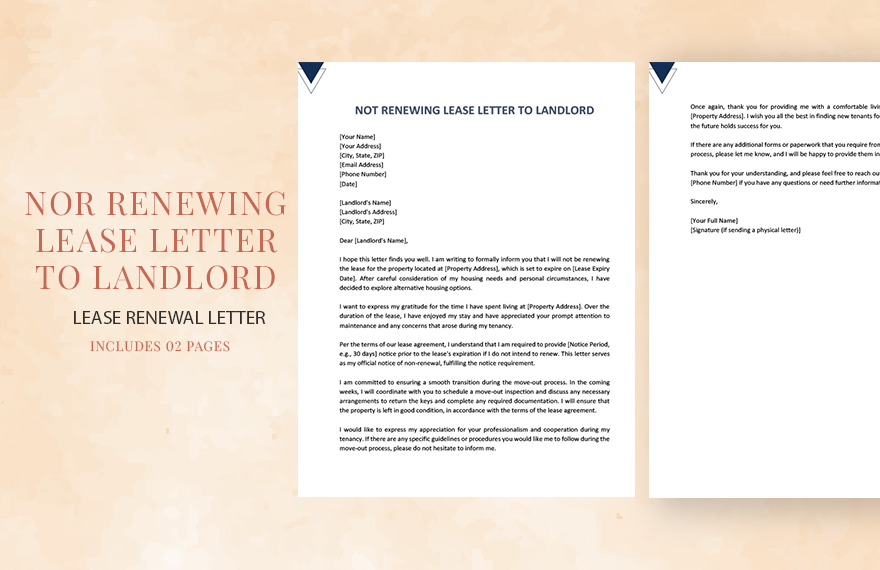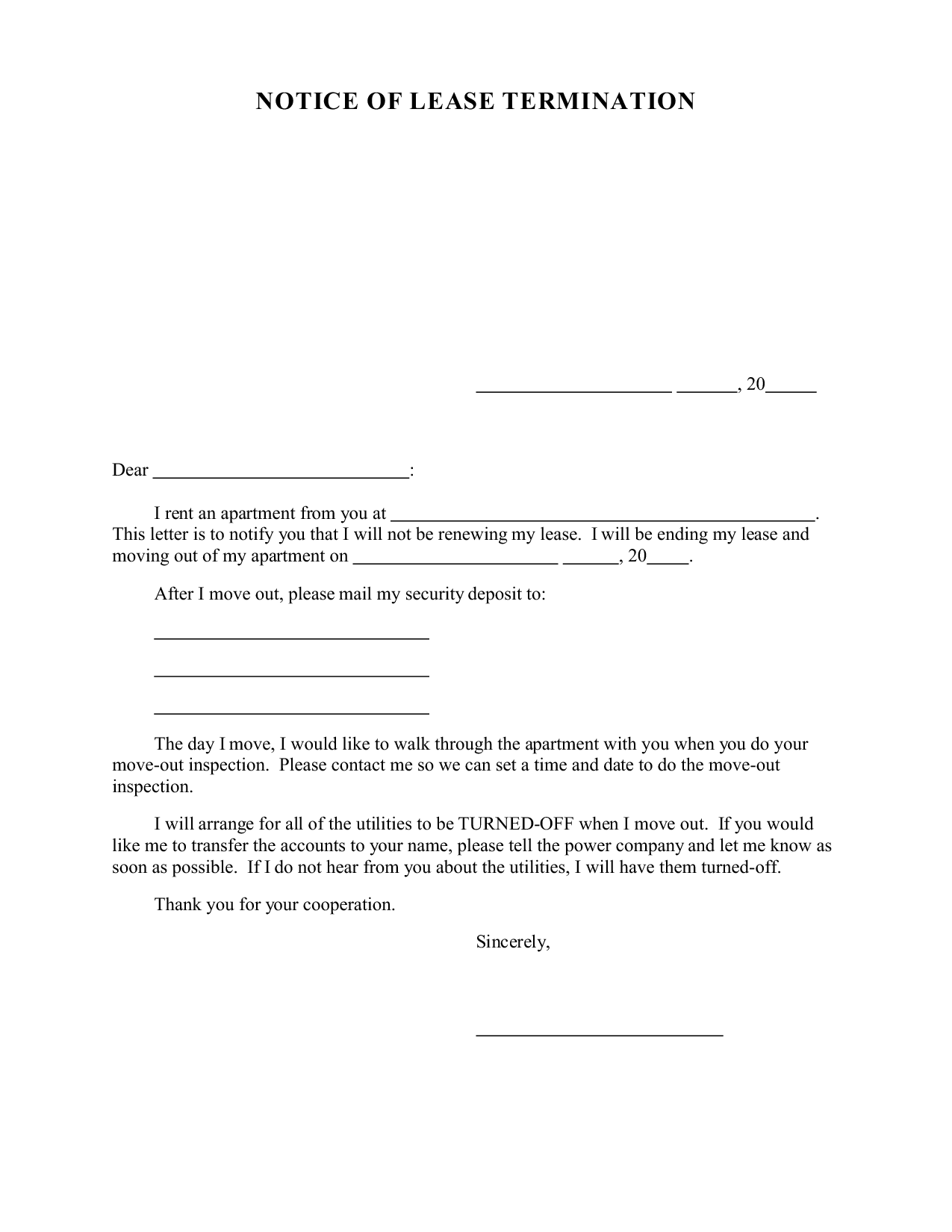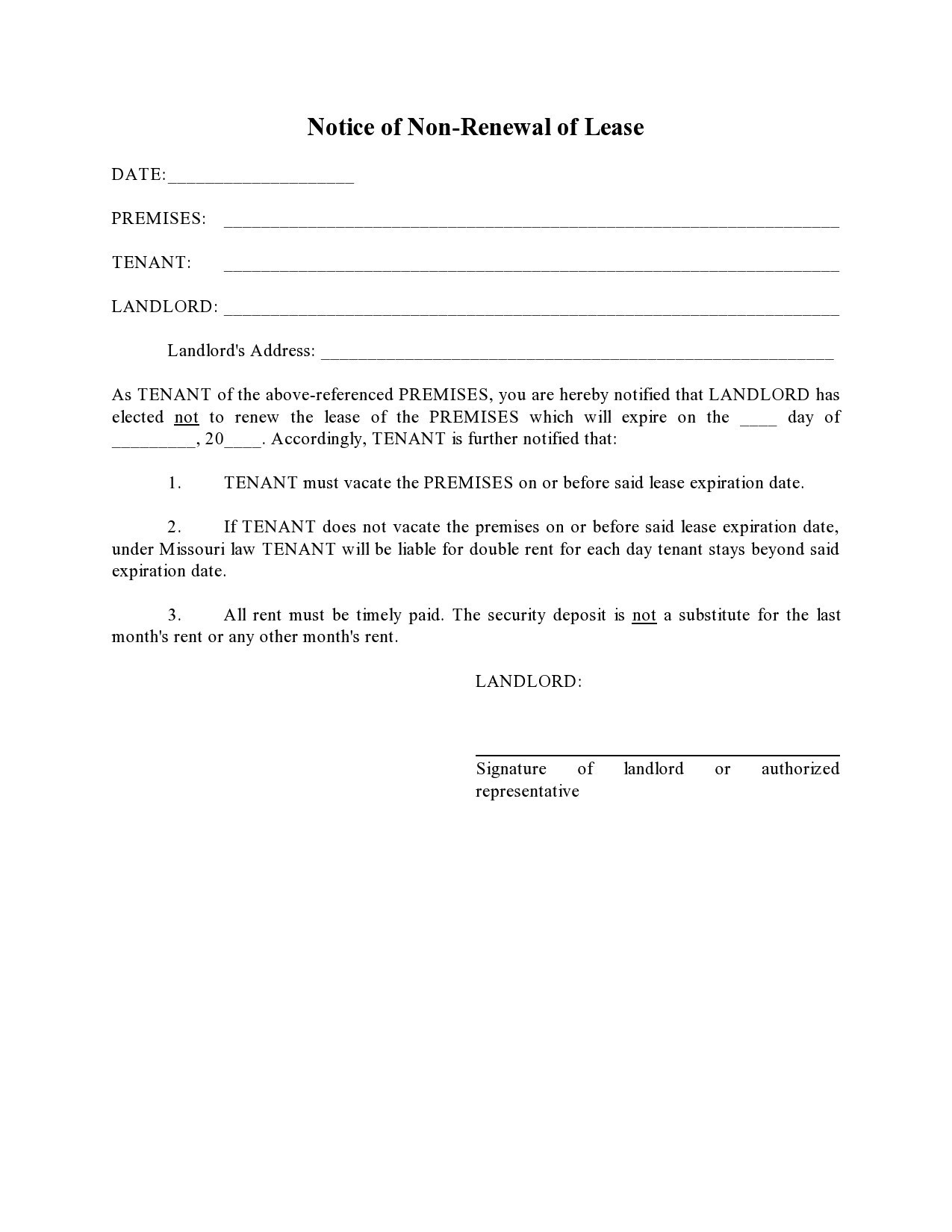Deciding not to renew your lease is a significant step in your rental journey, and communicating this decision properly is essential. Writing a formal letter to your landlord to not renew your lease is more than just a courtesy—it’s a legal requirement in many cases. This article provides a step-by-step guide on how to craft a professional, clear, and legally sound letter.
When it comes to ending a lease agreement, misunderstandings can lead to unnecessary conflicts. By sending a well-written letter to your landlord, you ensure that all parties are on the same page. Not only does this protect you legally, but it also helps maintain a good relationship with your landlord.
Whether you’re moving for personal reasons, seeking better housing options, or simply ending your tenancy, this guide will walk you through the process of writing an effective letter. Let’s dive in and explore how to communicate your decision professionally and effectively.
Read also:Irvine Spectrum Movies Your Ultimate Guide To Entertainment
Table of Contents
- Why Write a Letter to Landlord to Not Renew Lease?
- Understanding the Legal Requirements
- Preparing to Write Your Letter
- The Proper Format for Your Letter
- Key Content to Include in Your Letter
- Sample Letter to Landlord
- Tips for Writing an Effective Letter
- Frequently Asked Questions
- Common Mistakes to Avoid
- Conclusion
Why Write a Letter to Landlord to Not Renew Lease?
Writing a formal letter to your landlord about not renewing your lease is more than just a polite gesture; it’s a critical step in managing your tenancy responsibly. Many lease agreements require tenants to provide written notice of their intention to vacate the property. Failing to do so could result in unintended consequences, such as being charged for an additional lease term or facing disputes over security deposits.
A written letter serves as official documentation of your decision. It ensures clarity and avoids misunderstandings between you and your landlord. Additionally, it demonstrates professionalism and respect, which can help preserve a positive relationship with your landlord, even after your tenancy ends.
Benefits of Sending a Letter
- Provides legal protection by fulfilling notice requirements.
- Establishes a clear record of your intent to vacate.
- Helps avoid potential disputes or confusion.
- Shows respect and professionalism toward your landlord.
Understanding the Legal Requirements
Before drafting your letter, it’s crucial to understand the legal requirements surrounding lease termination. These vary depending on your location, lease agreement terms, and local laws. Most jurisdictions require tenants to provide advance notice—typically 30 to 60 days—before the lease expires. However, some leases may stipulate longer notice periods, so always review your lease agreement carefully.
In addition to the notice period, familiarize yourself with any specific rules or procedures outlined in your lease. For example, some landlords may require the notice to be delivered in person or via certified mail. Understanding these details ensures compliance and minimizes the risk of legal issues.
Review Your Lease Agreement
- Check the notice period specified in your lease.
- Look for any special instructions regarding how to deliver the notice.
- Identify any additional clauses related to lease termination.
Preparing to Write Your Letter
Before sitting down to write your letter, gather all necessary information. This includes your lease agreement, the landlord’s contact details, and the date by which you plan to vacate the property. Having this information at hand ensures accuracy and avoids errors that could lead to confusion later.
Additionally, consider the reasons behind your decision not to renew the lease. While you’re not obligated to disclose personal reasons, having clarity on your motivations can help you frame the letter appropriately. For example, if you’re moving for work or family reasons, mentioning this briefly can add context without revealing too much private information.
Read also:Conchita Alonso The Iconic Journey Of A Multifaceted Star
Gather Necessary Information
- Lease agreement details (notice period, delivery method).
- Landlord’s name and contact information.
- Move-out date and reasons for leaving (optional).
The Proper Format for Your Letter
The format of your letter plays a vital role in its effectiveness. A well-structured letter is easier to read and understand, ensuring that your message is conveyed clearly. Use a formal business letter format, including your contact information, the landlord’s details, and a polite salutation.
Begin with a clear subject line stating your intention, such as “Notice of Intent Not to Renew Lease.” Follow this with a concise introduction explaining your decision and the date you plan to vacate. Use short paragraphs to break up the content and make it more digestible for the reader.
Key Elements of the Letter Format
- Your contact information (address, phone number, email).
- Landlord’s name and address.
- Date of the letter.
- Subject line clearly stating your intent.
- Polite salutation (e.g., Dear [Landlord’s Name]).
Key Content to Include in Your Letter
When writing your letter, ensure that you cover all essential points. Start by stating your intention not to renew the lease and the date you plan to vacate. If applicable, briefly mention the reasons for your decision. Next, reiterate your commitment to fulfilling all obligations under the lease agreement, such as maintaining the property until your departure.
Also, include details about returning the keys and any outstanding matters, such as security deposit refunds. This demonstrates responsibility and helps streamline the process for both parties.
Important Details to Include
- Statement of intent not to renew lease.
- Move-out date.
- Brief explanation of reasons (optional).
- Commitment to fulfill lease obligations.
- Arrangements for key return and security deposit.
Sample Letter to Landlord
Below is a sample letter to help you craft your own. Customize it according to your specific situation and lease agreement terms.
Subject: Notice of Intent Not to Renew Lease
Dear [Landlord’s Name],
I am writing to formally notify you of my decision not to renew the lease for the property located at [Property Address]. My current lease agreement is set to expire on [Lease Expiration Date], and I plan to vacate the premises by [Move-Out Date].
I have thoroughly enjoyed living in your property, but due to [reasons for leaving, if applicable], I have decided to move. Please let me know if there are any specific procedures I need to follow to ensure a smooth transition.
I will continue to uphold all responsibilities outlined in the lease agreement until my departure. I will also ensure the property is left in excellent condition and return the keys as per your instructions.
Thank you for being a supportive landlord during my tenancy. Please feel free to contact me at [Your Contact Information] if you have any questions or require further clarification.
Sincerely,
[Your Name]
Tips for Writing an Effective Letter
To ensure your letter is effective, keep the following tips in mind:
- Be clear and concise: Avoid unnecessary details and focus on the key points.
- Stay professional: Maintain a respectful tone throughout the letter.
- Double-check details: Verify all dates, addresses, and other information for accuracy.
- Proofread: Ensure the letter is free of spelling and grammatical errors.
- Keep a copy: Retain a copy of the letter for your records.
Frequently Asked Questions
What Happens If I Don’t Send a Letter?
Failure to provide written notice may result in automatic renewal of your lease or additional charges. Always adhere to the notice requirements outlined in your lease agreement to avoid complications.
Can I Send the Letter Via Email?
Check your lease agreement for acceptable methods of delivering the notice. If email is allowed, ensure you receive confirmation of receipt from the landlord.
Do I Need to Explain Why I’m Leaving?
No, you are not legally required to disclose your reasons for leaving. However, providing a brief explanation can help foster goodwill with your landlord.
Common Mistakes to Avoid
Avoid these common pitfalls when writing your letter:
- Missing deadlines: Ensure you submit the letter within the required notice period.
- Being too informal: Maintain a professional tone throughout the letter.
- Forgetting key details: Double-check all information before sending the letter.
- Not keeping a copy: Always retain a record of the letter for future reference.
Conclusion
Writing a letter to your landlord to not renew your lease is a straightforward yet important task. By following the guidelines outlined in this article, you can craft a professional, legally sound letter that communicates your decision effectively. Remember to adhere to the notice period, maintain a respectful tone, and include all necessary details.
We encourage you to take action now by drafting your letter and reviewing your lease agreement. For further assistance, explore related articles on our site or leave a comment below with any questions you may have. Together, let’s make your transition seamless and stress-free!



